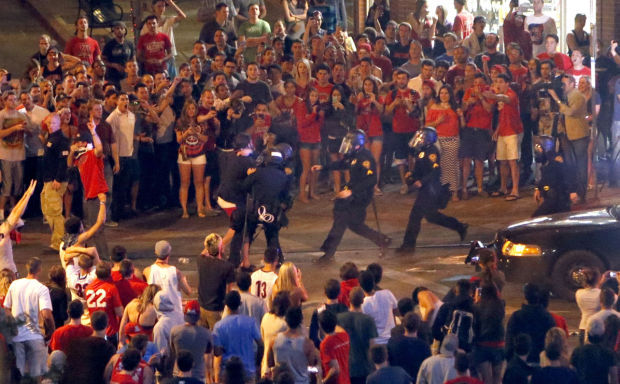With March Madness tipping off, the City Council has backed away from a plan to crack down on the alcohol-fueled madness that often follows a University of Arizona victory or defeat in its final game.
The council was set to impose strict new rules on unruly crowds, but dropped the plan Monday after protesters complained the restrictions were too broad, questioning how they could be applied to peaceful protests.
The proposed ordinance would have given the Tucson police chief new powers, including:
- The ability to decide whether to apply “crowd management” rules to any gathering of at least 100 people, and to decide who can attend the gathering.
- Setting geographic boundaries for the crowd, where it would be illegal to throw things.
- Making it a misdemeanor crime to wear a mask or to refuse to leave when told by police to leave.
Deep runs by UA in the NCAA basketball tournament — such as the one anticipated this year — have frequently generated large, unruly crowds in the entertainment districts along North Fourth Avenue and East University Boulevard.
The draft ordinance was written by Tucson Police Department legal advisers.
In a memo to the City Council, Deputy City Manager Kelly Gottschalk said large public gatherings “present a myriad of public safety concerns.”
The council was scheduled to vote on the ordinance Tuesday night, but the item was removed from the agenda Monday afternoon and the draft policy was removed from the city’s website.
Councilman Steve Kozachik said the draft ordinance “steps all over the First Amendment.”
“It’s wrong, if not clearly unconstitutional,” he said.
It invites litigation and erodes public trust, Kozachik added.
The plan is not scheduled to be considered at a future meeting at this time, said city spokeswoman Lane Mandle.
After Arizona lost to Duke in the 2001 tournament, it took 400 police officers to handle a mob of 2,000 people, some of whom lit vehicles on fire and broke windows.
The city eventually paid out more than $850,000 in claims, including $765,000 to a man who lost an eye after a police beanbag hit him.
TPD has struggled with crowd-control issues after tournament games.
Last year’s plan included making police presence “highly visible.”
Officers ended up using canisters of aerosolized pepper spray and pepper-ball ammunition to break up a crowd on East University Boulevard after an Elite Eight loss. Students were throwing bottles at the officers in the aftermath of the defeat to Wisconsin.
Police Chief Roberto Villaseñor later said he would rethink having officers in full riot gear visible to the crowd.
In July, Villaseñor said he wanted the City Council to enact an ordinance to create “celebration zones.”
City attorney Mike Rankin said TPD leaders meant for the draft ordinance to give police ways to deal with crowds before a gathering of fans becomes a riot. When there are more people than police can safely control, TPD wants to be able to close off streets and redirect the crowd, he said.
But the draft ordinance is “too broadly phrased,” Rankin said Monday after the issue was removed from the council agenda.
“It’s not ready for prime time,” he said.
Kozachik said he’s all for making sure Fourth Avenue doesn’t see riots, but he said the rules as drafted are so broad that they could also apply to political rallies and other kinds of events.
Tucson civil rights attorney Paul Gattone helped organize a protest of the proposed rules in downtown Tucson on Monday evening. About 40 people attended.
He called the proposed ordinance “a serious threat to our ability to organize and to associate,” and said he was shocked such an ordinance would even be proposed.
“The right of free association and assembly is critical to a democratic system,” said Gattone, who has been representing people arrested or threatened with arrest during protests for 26 years. “And for police to have the unilateral power to curtail that assembly — well, I can’t imagine that it’s constitutional.”
Rankin said the city is stepping back to rethink the plan because TPD leaders didn’t intend it to be so broad, nor did they intend it to apply to political rallies, immigration protests or any First Amendment-protected events.





